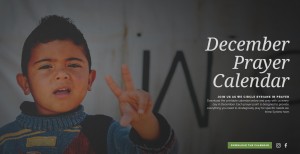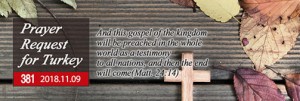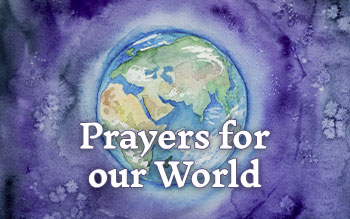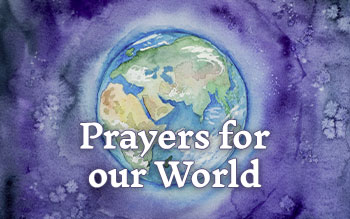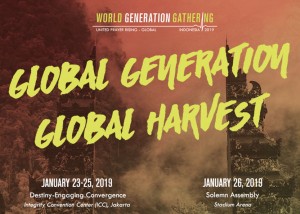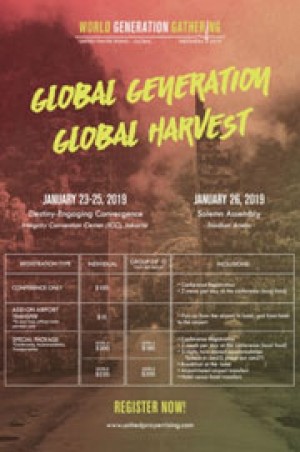Displaying items by tag: Asia
Yemen: peace talks begin
On 6 December, delegations from both the Yemeni government and the Houthi rebels began peace talks near Stockholm. Abdullah al-Alimi, a representative of the Yemeni government, tweeted that the conference was ‘a true opportunity for peace’. Mohamed Abdelsalam, who heads the Houthi delegation, promised to ‘spare no effort to make a success of the talks’. Pray for God to quell the scepticism of observers. Pray for the Yemeni government to resist launching an all-out attack on the key port city of Hudaydah, currently controlled by the rebels. The talks began encouragingly, with an agreement to exchange 5,000 prisoners: see
Turkey: Christian persecution
The high degree of Turkey’s religious nationalism places incredible pressure on Christians. The government doesn’t target Christians directly, but its nationalistic bias leaves little room for Christians to preach the gospel, which is considered an opposing message. Converts from Islam face social opposition, and often lead double lives to keep their faith hidden from family and community. If found out, they might be threatened with divorce and loss of inheritance rights, and all Christians face employment discrimination. Pray for Muslim-background converts to minister graciously and wisely to their families, especially if they are labelled and treated as traitors. Pray for evangelist David Byle who was refused re-entry into Turkey to be with his family. He had lived and preached there for 19 years and had experienced increasing harassment. See
Syria: 31 Days of Prayer - December 2018
Syria: 31 Days of Prayer - December 2018
It’s easy to master the art of ignoring other people’s pain when we don’t recognize their faces, and the chaos is not right IN our face. You didn’t ignore the pain of the Syrian people or the opportunity to join us, stepping into the gap 4 years ago this month with a 31 Day Prayer Focus.
Together we answered the call to what we sensed God asking, “If not you, who, and if not now, when? What are YOU waiting for?” Together we took action because a more urgent and radical response to the situation was needed from Christ’s Church. We believed God had dislodged something in the hearts and minds of Syrians, and it was now time for them to hear the good news afresh, like no other time in history.
It’s still their time NOW, and we can’t miss it. The Church can’t miss it. Or, is it another tragedy of neglect and callousness toward God himself?
What God has done in the intervening years is another whole story. Within 2 weeks, over 1,000 people were praying from over 100 Nations. We’re not sure how all that happened so quickly. We can only attribute that to the more than 200 of you who said you would become a Circle Starter -- and gathered groups of friends and family to pray with you.
Several 1,000’s were activated through the prayer initiative to go work among the refugees in the harsh camps, tent settlements, and cities of Europe, Lebanon, Jordon and Turkey. Many have come to faith along the journey and in new host countries. Many dollars were given for relief, evangelism and church planting efforts, as well as training new believers to reach their own people.
We’re convinced there is a future story too. In some ways, a lot has changed, but many things have not.
What has changed? Many have come to faith and are now being discipled and discipling others.
These are estimates since the violence erupted:
• 500,000 have been killed (Total population in 2011 before the war was 21 million)
• 1.8 million have been injured
• 5.6+ million have fled the borders
• 6+ million are internally displaced
What has NOT changed?
• They have no guaranteed safety
• They’re still victims of other people’s wars.
• For most, they still haven’t been integrated into their host nations - many without jobs or warmth during winter, and some still hungry.
• Most children are still not being educated 7 years later.
Yet -- GOD is still drawing many to Himself in the midst of the loss, pain, and chaos. He’s not asleep, distracted or off duty.
Now is not the time to give up. Will we let the hope of future generations dissipate because we stopped praying? We must persevere and capture the lessons we’ve learned and press into the future with fervent prayer for the Syrian people and the region. We believe there is too much still at stake.
Will you prayer-push with us once again a few minutes each day this December?
There is no better time than when it’s no longer in the news, and many have forgotten! Fire up those “prayer circles” once again. We will send out revised and daily prayer prompts and also have available a downloadable 31-Day prayer guide.
31 - Day Prayer Guide and Flipboard Magazine
You can click on the link here to download a printable pdf of the guide.
We launched a Flipboard Magazine to curate articles on the crisis. Click on the link here
The Syrian Circle Team
Turkey – Prayer Requests
Muslim refugee had dream about God, found Him in Spain
Fearing for their lives, Achmed and his family left Syria’s raging civil war and managed to make their way to Madrid, Spain. Before they left Syria, Achmed had a powerful dream that God told him He wanted to know Him. He couldn’t get the dream out of his mind, but he didn’t fully understand it, so he continued to ponder it in his heart, according to a report by Christian Aid Mission (CAM).
European Union and Spanish authorities sent the family to the province of Cadiz in southwestern Spain, where a Christian ministry was helping to integrate refugees into society.
The ministry proposed putting refugees in apartments rather than camps, with the government subsidizing part of the cost.
Achmed was stunned that Christians would give so much time and effort to total strangers. One day he approached the ministry director, Pablo, with a question: “Why are you helping us in so many ways?” he asked.
“We believe in God, who loves people and wants us to help other people,” Pablo replied. “Jesus Christ came to die for us, and He asks us to die for you.”
His reply prompted even great curiosity about the Christian God, and he asked Pablo to tell him more. They had several more conversations, and soon Achmed began to attend Sunday worship services and some other activities. He began to read the Bible online.
One day he told Pablo, “All I have read, I believe. The only problem I have is God having a child.”
Like many Muslims, he had trouble with the idea of God having a Son. But in spite of that difficulty, he confessed that he couldn’t save himself from the death and eternal punishment that sin brings.
He confessed to Pablo his need for Jesus Christ, put his faith in Him as his Lord and Savior, and was born again.
Then God reminded Achmed of the powerful dream.
“He said that he remembered having a dream in Syria in which God told him He wanted him to know Him, and now he knew what it meant,” Pablo said. “He became a believer three months ago.”
“Thousands of such Muslim refugees are streaming into Spain as other countries of Europe turn them away, and many are coming to Christ every month,” according to the report by CAM.
“The former Muslims face daunting pressures. Achmed’s wife sought to divorce him after he became a Christian, and only after many talks with native missionaries did she and her mother accept Achmed – and Christ.
“Now they also come to church, and God is working in their lives,” the ministry director said.
Pray: that God would continue to reveal Himself with the dreams and visions among refugees, as promised in Joel 2
Pray: that those refugees who came to faith in Jesus Christ would grow spiritually in a local fellowship(church)
Pray: that the local fellowships and churches would be established and planted among those refugee believers. Send more workers to Your harvest field!
More:http://silkwavemission.com/board.php?board=english&command=body&no=1012
260,000 Syrians returned to ‘Euphrates Shield’ operation area: Turkish defense minister
A total of 260,000 Syrian nationals have returned to a swathe of land in northern Syria where Turkey carried out a cross-border operation dubbed “Euphrates Shield,” Defense Minister Hulusi Akar said on Nov. 1.
Turkey launched Euphrates Shield in 2016 to drive away ISIL and YPG militants from its border with Syria. Ankara regards the United States-backed YPG as a terrorist organization due to its ties with the illegal PKK. The operation ended in 2017.
Turkey hosts more than 3.5 million Syrian refugees who fled the conflict in their homeland.
“As a result of the infrastructure work and the security and stability in the region provided by the Turkish Armed Forces, around 260,000 Syrian nationals have returned to the Euphrates Shield Operation area,” Akar told lawmakers at the planning and budget commission in parliament.
The defense minister also touched upon the Manbij deal between Turkey and the U.S., saying that “despite the promises” made for the YPG’s withdrawal from the city, the group was still deployed there.
“The terror group is digging ditches in Manbij as they have done in Afrin,” he said.
The YPG “should know it will be buried in the trenches it has dug,” Akar said.
The Manbij deal focuses on the withdrawal of YPG militants from the city to stabilize the region northeast of the Aleppo province in northern Syria.
Pray: that God would open ways for those 260,000 to hear the Good News of Jesus Christ even after they return to their home.
Pray: that the on-going conflicts between Turkey and PKK and other groups of Kurds would find a peaceful resolution, and ultimately end in peace.
Pray: that the Prince of Peace and His Kingdom would come in power in those areas.
More:http://silkwavemission.com/board.php?board=english&command=body&no=1013
SILK WAVE MISSION USA
Prayer Update from Israel
UNPRECIDENTED ROCKET ATTACK, GOVERNMENTAL RESIGNATIONS, A GOVERNMENT POISED TO FALL—RECOVERED, BUT HOLDING ON BY A THREAD.
Hamas rained down almost 500 rockets on Southern Israel over a two and a half day period. Netanyahu sat 7 hours with his cabinet discussing whether or not to go to war.
Some of his cabinet felt there was no other choice except to go to war, as these last months of terrorism - sending fiery balloons over the border burning up farmland and forest areas, hordes of Palestinians trying to break through the border, etc., etc., etc. were bringing a living hell to the Israeli citizens in the south.
Others believed that because of the certain loss of many lives in the IDF that would occur, and the world's condemnation that would surely come, if Egypt could help put together a cease-fire agreement between Israel and Hamas, that would be the best direction.
Netanyahu chose the latter. Defense Minister Avigdor Lieberman was furious and resigned, taking his party of 7 Knesset seats with him. That left Netanyahu with 61 Knesset seats in his coalition. Netanyahu needs 61 out of 120 to lead the nation.
Naftali Bennett, who also felt the nation must go to war to defeat Hamas and give relief to the hundreds of thousands of Israelis in the south, told Netanyahu he wanted to take Lieberman's place as defense minister - or he would leave the government with his 8 Knesset seats. Netanyahu refused and Bennett says he is also leaving the government. That means elections are here.
It would seem logical that Netanyahu believes he can win a snap election, or he would not have let his government fall. He would have given Bennett the job.
Netanyahu is the most popular politician in Israel. The issue is that he has the entire group of ultra-Orthodox parties in his coalition, as he bends towards the religious. That means the Haredim (ultras) have tremendous power in Israel. They basically let Netanyahu do whatever he wishes to do, as long as he fills their coffers with shekels to support their men of whom the majority won't work or serve in the army. Aside from the harassment and persecution against Messianic Jews and Messianic congregations, the Haredim take far more than their share of finances, and give back little to Israeli society.
Yet, there is no other strong leader in any of the other parties that stands out who the Israeli public have faith that he or she can keep Israel in survival mode. Israel lives in the most dangerous neighborhood in the world.
So let us pray for God's will to be done in this upcoming election (2019).
Lord, we pray, in the awesome Name of Yeshua, that You will hear the prayers of Your people who have a personal relationship with You and Your Son, and give us relief from the Haredi persecutors. We pray that You will put together the coalition that You desire. Hear the words of our hearts, because we don't know who we should pray for or how to pray. But You have a plan. You have a plan to save all Israel and to bring revival to the nations of the world.
Use Your people here in Israel that love You. Give us opportunities and freedom to spread the Word of God more and more here in Israel.
SHIRA SORKO-RAM
PLEASE PRAY:
- That God will “redeem Israel out of all of his troubles” (Psalm 25:22). That a government will be put in place which is not out of alignment with those redemptive purposes!
- That while it is time for the present government to stand, it will stand; when it is time for it to be replaced, that it will fall.
- That with the resignation of Defense Minister Lieberman, a man or woman of courage, integrity and wisdom for that job will be chosen to take his place.
- That, as Shira mentions above, the ultra-Orthodox members of the present government (or one which may arise in its place), will not be allowed to work injustice nor take unfair advantage of their positions to coerce the government in a direction which is unrighteous and unjust.
- That God minister strongly to Prime Minister Netanyahu during this time. That he humble himself before his God, and allow himself to be led in ways which are truly aligned with God’s purposes for Israel this year. That he fulfills the length of days God has ordained for him to lead. That a godly, strong God-fearing leader be being nurtured to be raised up to take his place.
- That the warm, strong relationship between the governments of Israel and the United States which God has brought into place during this season would not be threatened or adversely effected by a shake-up in the Israeli government outside of God’s timing.
Martin and Norma Sarvis
Jerusalem
Afghanistan - ongoing prayer needed
There is very serious and heavy fighting going on in many areas in the country. The defense minister Tariq Shah Bahrami said that battles are ongoing in at least ten provinces in the country and that the level of threats are beyond the capabilities of government. The battles are currently simultaneous going on especially in these provinces: Ghazni, Uruzgan, Faryab, Jawzjan, Sar-e-Pul, Kunduz, Badghis, Baghlan and some other areas.
On Wednesday Afghanistan’s Lower House of Parliament summoned the heads of the security institutions for the second time in a week on the situation in the country, particularly on Ghazni and Uruzgan provinces (where many Hazaras live).
The defense Minister made this sad statement: “To be honest, the level of threats is very high and the current facilities available to security and defence institutions is not enough to repel these threats. Afghanistan’s enemies are plotting to bring us to our knees. The enemies and supporters of enemies (neighbouring countries etc.) of the people of Afghanistan including the backers of terrorists have made their final plots to break our back.”
Another statement from the Minister of Interior Mr. Barmak shows their desperation: “the minister of defense and myself remain busy on the telephone until 2am and 3am (daily); we call here and there to this and that commander and get updates on the situations, and the commanders shout for help.”
The Taliban have attacked and conquered several areas of the minority Hazara Shia community and it is feared that they will commit many atrocities there. Often the Taliban killed Hazaras and even targeted their mosques and schools. Thousands of Hazaras are fleeing their villages and many have come also to the capital.
This situation is like a desperate cry, from the ministers and commanders on the field and the people that are suffering and we are wondering that how long the Army is able to push back the Taliban.
Please pray with us urgently and strongly
For the Lord to intervene in this very desperate and increasingly hopeless situation.
That the Taliban Forces would be defeated soon and that the government troops will be able to defend their country.
Especially now that they will be driven out of the Hazara areas and for protection of these vulnerable community.
For wisdom for the government and especially the Defence Ministry and Army and that they will receive all the help they need.
Thank you for standing in the gap for this embattled country. This has gone on for so long but we believe that as we earnestly pray for this country, once again we will see a breakthrough and a defeat of this that try to destroy this country.
We believe that even this situation will turn around as we pray!
WORLD GENERATION GATHERING: Jakarta, 23-26 Jan 2019
The theme of this international assembly of on-fire Millennials and youth along with those from other generations will be- “Receiving the Moravian Lampstand: Prayer + Missions.” The organizers are envisioning to bring together a projected estimate of 4,000 youth and young adult leaders for a 3-day destiny-engaging convergence which will be held at the ICC-MGK in North Jakarta, and an estimated 10,000 for the Solemn Assembly which will be held at the Stadium Area in Senayan.
Like the first global gathering in Korea, we believe that this will awaken the young “Davids” to fight against their generation’s “Goliaths,” and against the injustices in the nations. It will provoke them to wake up and do something. And we believe that the greatest injustice today remains to be this: that JESUS is not worshipped in the nations. We know that only Jesus can bring true justice. So, the UPRISING will not just be a call for the youth to gather in prayer, but it will be a call to battle from a place of extravagant worship and united prayer as we launch a global generation to a global harvest, all unto the hastening of the return of the Desired of nations: Jesus Christ!
We will also be locking arms with Indonesia as she is being released to her destiny at this hour. We will join her in contending for the ancient doors to open up, as we believe that it will be the key for the other ancient gates in the nations to open too, toward taking the gospel back to Jerusalem, and preparing the church to welcome the King of glory (Psalm 24:7-10)!
The Moravians once cried, “may the Lamb who was slain receive the due reward of His suffering.” In the spirit of the Moravians, we long to see the Church prepared for His coming again. It is our prayer that this gathering in Indonesia in January will be catalytic in awakening a generation in the nations to have a deep longing for Jesus’ return, and thus, align their lives unto that.
God is releasing a new wave of the Jesus Movement, of the Azusa Street Revival, of the Wales Revival, of the Moravian Revival on steroids… another great awakening is being sparked! This is the Psalm 24 generation that God has been waiting for. We hope you can join us in catalyzing these waves of youth-led global prayer and mission movements at the UPRISING, and together, let us labor for the Lamb to receive His inheritance in the nations.
 Here is the latest video about the Global UPR which we would appreciate your sharing with your various networks and constituencies, especially the younger generation, encouraging them to take part in this life-changing, world-impacting gathering; all are welcomed to take part. UPRising promo video --https://youtu.be/3xrEl4UdsTE.
Here is the latest video about the Global UPR which we would appreciate your sharing with your various networks and constituencies, especially the younger generation, encouraging them to take part in this life-changing, world-impacting gathering; all are welcomed to take part. UPRising promo video --https://youtu.be/3xrEl4UdsTE.
Preview YouTube video World Generation Gathering: Global UPR 2019 Indonesia
More Info and Register HERE
United Prayer Rising Events
UPRISING Global: Jakarta, Indonesia - January 23-26, 2019 (WYPA)
http://unitedprayerrising.com
World Generation
Jakarta, Indonesia, January 23-26, 2019
Please pray for and consider taking part in this world youth prayer assembly in January. Here is a video and details to register. You will want to forward this to younger generation believers but anyone is welcome.
Iran: poverty rising
The World Bank reported that after sanctions were removed in 2016 there were many positive economic developments in Iran. In November 2018 the US reimposed sanctions and requested India, China and EU countries, to stop working with Iran. Sanctions are major causes of food insecurity, mass suffering, and eventual high poverty rates. Oil is the largest source of income. When there is no oil coming, there are no US dollars. Everything purchased in Iran is with US dollars. ‘No dollars’ causes the value of the Iranian rial to fall drastically, causing many companies to go bankrupt and having to let a lot of employees go. Sanctions increase the gap between the rich and poor. However there are a number of Christian business and mission initiatives established in Iran, including church-planting via small businesses. See
China: Christian growth despite Orwellian pressures
China’s planned artificial intelligence-controlled ‘social credit’ system is bringing a new depth of intervention into the lives of its citizens, including Christians. A vast network of advanced surveillance technology uses monitors individuals’ location, records their facial expressions and body language, and tracks all movements, giving them ‘social scores’ as they go about their daily lives. The expanding system could severely affect Christians if they are deemed to demonstrate ‘dissent’. In September 2018 the largest house church in Beijing was shut down for refusing to have security cameras inside their building, and 344 pastors called on the authorities to allow full religious freedom, adding, ‘For the sake of the gospel, we are prepared to bear the loss of our freedom and of our lives.’ Meanwhile the Bible Society reported the Bible is China’s best-seller, even though there are only 4,600 ordained pastors. On average, every pastor is responsible for 6,700 Christians.


